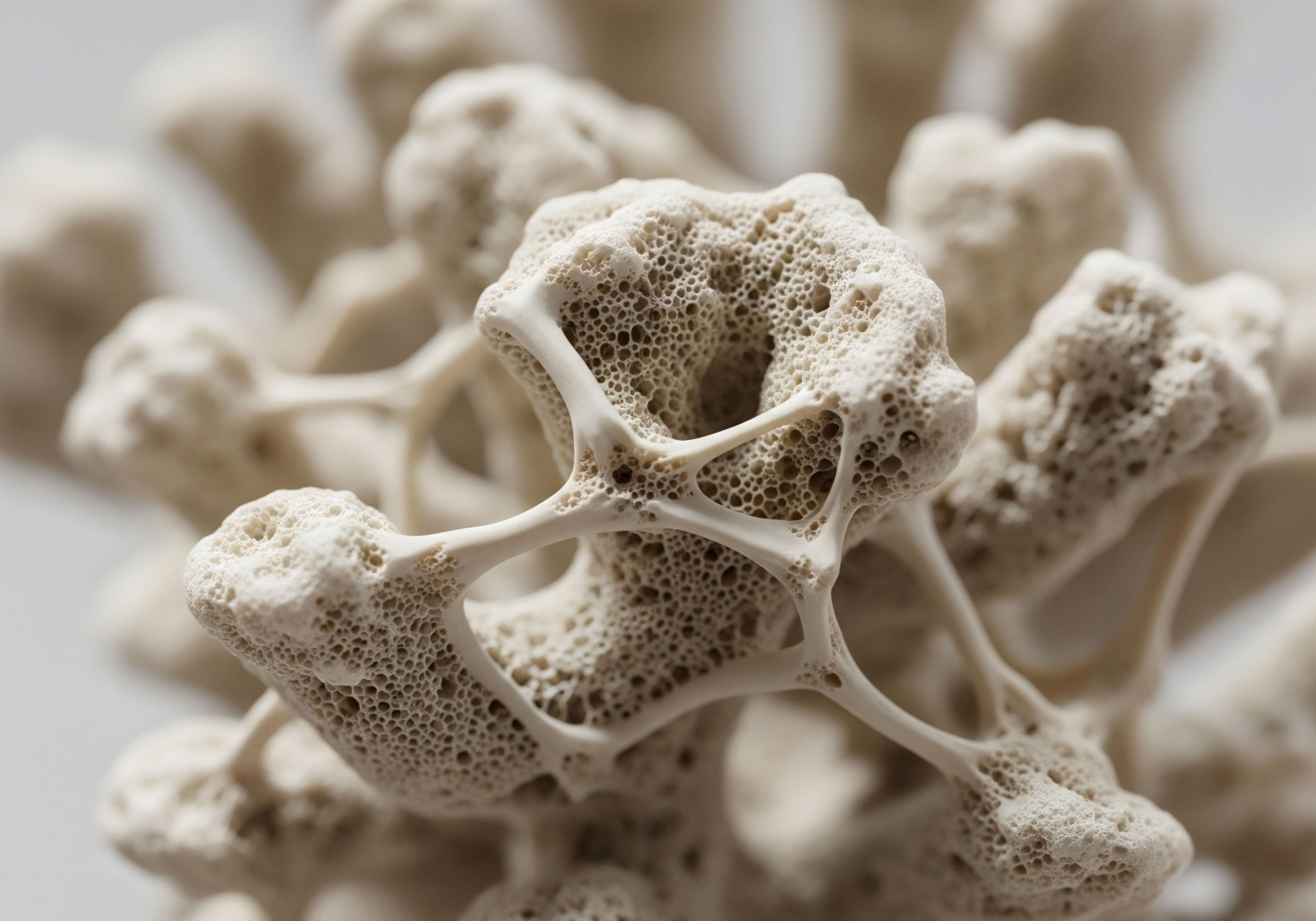

Fundamentals
That feeling of walking into a room and forgetting why you entered, the struggle to retrieve a specific word that sits on the tip of your tongue, or the general sense that your mental sharpness has dulled ∞ these experiences are deeply personal and can be profoundly unsettling.
Your perception of this cognitive fog is real. It is a valid biological signal, a message from your body’s intricate control system that something has shifted. The journey to mental clarity begins with understanding the source of these signals, which very often originates within your endocrine system.
Think of your body as a vast, complex organization. The endocrine system is its internal communications network, and hormones are the chemical messengers carrying vital instructions from one part to another. These messengers, such as estrogen, progesterone, and testosterone, are produced in specific glands and travel through the bloodstream to target cells throughout the body, including the brain.
Your brain is densely populated with docking stations, or receptors, specifically designed for these hormones. When a hormone molecule locks into its receptor, it triggers a cascade of biochemical events inside the brain cell, directly influencing everything from energy metabolism and cell repair to the speed and efficiency of your thoughts.
The sensation of cognitive decline is often a direct reflection of changes in the hormonal messengers that regulate brain function.
When hormonal levels are optimal and in proper relationship to one another, this communication network functions seamlessly. Your brain’s ability to form memories, maintain focus, and process information is supported. During significant life transitions like perimenopause and menopause in women, or andropause in men, the production of these key messengers changes dramatically.
The decline or fluctuation of estrogen, progesterone, and testosterone means fewer messages are being sent, or the messages are becoming inconsistent. This disruption to the brain’s established communication patterns is what you experience as a loss of mental clarity, difficulty concentrating, or memory lapses. The system is still working, but its efficiency is compromised.

The Brains Hormonal Foundation
The influence of these chemical signals on cognitive wellness is profound and specific. Each hormone plays a unique role in maintaining the sophisticated machinery of your mind.
- Estrogen is a primary regulator of synaptic plasticity, which is the brain’s ability to form new connections and adapt. It supports healthy blood flow to the brain, ensuring neurons receive the oxygen and glucose they need for optimal function. It also modulates the production and activity of key neurotransmitters like serotonin and dopamine, which are central to mood and focus.
- Progesterone has a calming effect on the brain, often described as a natural counterbalance to the stimulating effects of other hormones. It interacts with GABA receptors, the primary inhibitory neurotransmitter system, which helps reduce anxiety and promote restful sleep. Quality sleep is fundamental for memory consolidation and cognitive restoration.
- Testosterone, while present in both men and women, is particularly influential in areas of the brain associated with spatial ability, executive function, and motivation. It works to support the integrity of neural tissue and has a direct impact on drive and mental stamina, contributing to the feeling of being sharp and engaged.
Understanding these roles allows us to see that hormonal health and cognitive wellness are inextricably linked. The path to reclaiming mental clarity involves a careful assessment of this internal communication system to identify where the signals have weakened and how they can be restored to their optimal state.


Intermediate
Moving from the foundational understanding of hormones as brain messengers, we can now examine the clinical strategies designed to restore cognitive function. Hormonal optimization protocols are precise, data-driven interventions. The goal is a recalibration of the endocrine system to support neurological health. The effectiveness of these protocols depends heavily on the type of hormones used, the timing of the intervention, and the unique biological context of the individual.

Hormone Recalibration for Female Cognitive Wellness
For women, the transition through perimenopause and into menopause represents one of the most significant shifts in endocrine function. The fluctuating and eventual decline of estrogen and progesterone production by the ovaries directly impacts the brain. Research increasingly points to a “critical window” for intervention. Initiating hormonal therapy around the onset of menopause appears to offer the most significant neuroprotective benefits. Delaying intervention for many years may reduce its effectiveness for cognitive preservation.

Why Do Hormone Type and Timing Matter?
The specific molecules used in therapy are of supreme importance. The body’s receptors are designed for specific chemical keys. Using hormones that are structurally identical to those the body naturally produces yields a more predictable and beneficial biological response. This is particularly relevant when considering progesterone’s role.
Natural, bioidentical progesterone supports the brain’s GABAergic system, promoting calm and restorative sleep, which are essential for cognitive function. Conversely, many older, large-scale studies used synthetic progestins, such as medroxyprogesterone acetate (MPA). These synthetic molecules have a different chemical structure and can interact with receptors in ways that produce different, and sometimes undesirable, effects on the brain and body.
The choice between natural progesterone and synthetic progestins is a critical variable in determining the cognitive outcome of a hormonal protocol.
| Hormone/Protocol | Primary Mechanism of Action | Potential Cognitive Impact | Clinical Considerations |
|---|---|---|---|
| Transdermal Estradiol | Binds to estrogen receptors in the brain, supporting synaptic plasticity, neurotransmitter balance, and cerebral blood flow. | When initiated in early menopause, it may help maintain verbal memory and executive function. | Timing is critical; benefits are most pronounced when started within the “critical window” near menopause. |
| Oral Micronized Progesterone | Acts on GABA receptors, promoting calming effects and improving sleep architecture. | Supports memory consolidation through enhanced sleep quality. May improve verbal working memory. | Structurally identical to endogenous progesterone, offering a different profile than synthetic progestins. |
| Low-Dose Testosterone Cypionate | Binds to androgen receptors in the brain, influencing dopamine pathways and neuro-muscular signaling. | May enhance mental stamina, focus, and motivation. Contributes to an overall sense of well-being that supports cognitive effort. | Dosage for women is significantly lower than for men and requires careful calibration based on symptoms and lab values. |

Testosterone Optimization for Male Cognitive Health
In men, the gradual decline of testosterone associated with andropause can manifest as fatigue, low motivation, and a reduction in mental sharpness. Testosterone replacement therapy (TRT) aims to restore testosterone levels to an optimal physiological range, addressing these symptoms at their root cause. While large-scale studies on cognition have produced mixed results, with some showing no benefit , smaller trials focusing on men with existing cognitive impairment have shown improvements in specific domains like spatial and verbal memory.
A comprehensive TRT protocol is a balanced system. It involves more than simply administering testosterone. It includes ancillary medications designed to maintain the body’s intricate hormonal feedback loops, which is essential for stable, long-term wellness.

What Does a Balanced TRT Protocol Involve?
A well-designed protocol considers the entire Hypothalamic-Pituitary-Gonadal (HPG) axis. This ensures the body’s hormonal symphony remains in concert.
- Testosterone Cypionate This is the primary component, a bioidentical form of testosterone delivered via injection to restore circulating levels of the hormone. This directly addresses the deficiency, supporting functions in the brain related to motivation and executive function.
- Gonadorelin This peptide is used to mimic the body’s natural Gonadotropin-Releasing Hormone (GnRH). Its inclusion prevents the testes from shutting down production completely, which can happen when the brain senses high levels of external testosterone. This helps maintain testicular size and some endogenous production.
- Anastrozole As testosterone levels rise, some of it is naturally converted into estrogen by the aromatase enzyme. While some estrogen is necessary for male health, excessive levels can lead to side effects. Anastrozole is an aromatase inhibitor that carefully manages this conversion, keeping estrogen within its optimal range.
By managing the entire system, this approach ensures that the benefits of testosterone restoration are realized without creating imbalances elsewhere. This systemic stability is the foundation upon which cognitive enhancement can be built.


Academic
A sophisticated analysis of hormonal influence on cognition requires moving beyond simple replacement models to a systems-biology perspective. The brain’s cognitive apparatus does not operate in isolation; it is deeply integrated with the body’s metabolic, inflammatory, and endocrine networks. The decline in mental clarity associated with hormonal shifts is a clinical manifestation of compromised neuro-cellular function.
Specifically, the interplay between sex hormones, neuroinflammation, and mitochondrial bioenergetics within key brain structures like the hippocampus and prefrontal cortex provides a compelling mechanistic explanation.

Neuroprotection the Role of Estradiol and Testosterone
Estradiol, at a molecular level, is a powerful neuroprotective agent. Its mechanisms of action are multifaceted. It upregulates the expression of anti-apoptotic proteins like Bcl-2, directly shielding neurons from cell death pathways. Furthermore, estradiol has been shown to promote synaptogenesis ∞ the formation of new synapses ∞ by increasing the density of dendritic spines on hippocampal neurons.
This structural enhancement is fundamental for learning and memory formation. Animal models have demonstrated that estradiol administration can attenuate the accumulation of amyloid-beta peptides, the primary component of the amyloid plaques found in Alzheimer’s disease, by modulating the enzymatic cleavage of the amyloid precursor protein (APP).
Hormonal optimization directly influences the cellular machinery responsible for neuronal energy production and defense against inflammatory damage.
In the male brain, testosterone exerts similar neuroprotective effects. It can be locally aromatized into estradiol within brain tissue, thereby conferring the same benefits. Additionally, testosterone itself binds to androgen receptors abundant in the hippocampus and cortex, modulating gene transcription to support neuronal integrity.
Studies suggest testosterone reduces oxidative stress and supports mitochondrial function, ensuring neurons have the high levels of ATP required for complex cognitive processing. Low testosterone levels are correlated with higher levels of pro-inflammatory cytokines in the brain, suggesting that restoring hormonal balance can help create a less inflammatory, more supportive environment for neural function.

How Do Peptides Support Cognitive Wellness?
Peptide therapies represent another layer of intervention, often working synergistically with hormonal optimization. Peptides are small chains of amino acids that act as precise signaling molecules. Therapies involving growth hormone secretagogues (GHS), such as Sermorelin or the combination of CJC-1295 and Ipamorelin, do not directly administer growth hormone. Instead, they stimulate the pituitary gland to produce and release growth hormone in a natural, pulsatile manner. This approach has profound, albeit indirect, effects on cognitive health.
The primary mechanism is through the dramatic improvement of sleep quality, specifically deep-wave sleep. During these deep sleep stages, the brain engages in critical maintenance activities ∞ memory consolidation, synaptic pruning, and the clearance of metabolic waste products via the glymphatic system. Insufficient deep sleep is directly linked to cognitive impairment.
By restoring a healthy sleep architecture, these peptides provide the brain with the necessary downtime to repair and reset, leading to improved daytime focus, memory recall, and overall mental clarity.
| Trial Name | Population Studied | Intervention | Key Cognitive Findings | Mechanistic Interpretation |
|---|---|---|---|---|
| Women’s Health Initiative Memory Study (WHIMS) | Postmenopausal women, average age 65+ | Conjugated Equine Estrogens (CEE) +/- Medroxyprogesterone Acetate (MPA) | Increased risk of dementia and no cognitive benefit. | Intervention was initiated far outside the “critical window” in an older population. The use of non-bioidentical hormones (CEE and MPA) likely contributed to the negative outcomes. |
| Kronos Early Estrogen Prevention Study (KEEPS) | Early postmenopausal women (within 3 years of menopause) | Oral CEE or transdermal 17β-estradiol, with oral micronized progesterone. | No significant difference in cognitive outcomes between treatment and placebo groups over 4 years. No harm was observed. | This trial supports the “critical window” theory, showing safety when initiated early. The lack of significant benefit may be due to the relatively short duration or the healthy cognitive status of the participants at baseline. |
| The Testosterone Trials (TTrials) – Cognition Arm | Men aged 65+ with low testosterone and age-associated memory impairment. | Testosterone gel for 1 year. | No improvement in verbal memory, visual memory, or executive function compared to placebo. | The study population was older, and the duration may have been insufficient to effect significant cognitive change. It also highlighted potential cardiovascular risks, emphasizing the need for comprehensive protocol management. |
The evidence from these large-scale trials, when viewed through a mechanistic lens, is illuminating. The conflicting results are largely explained by critical differences in the timing of intervention, the age and health status of the participants, and the specific hormonal agents used. This underscores the principle that a personalized, systems-based approach is required to leverage hormonal therapies for the successful enhancement of cognitive wellness.

References
- Hogervorst, E. et al. “Hormone replacement therapy for cognitive function in postmenopausal women.” Cochrane Database of Systematic Reviews, 2009.
- Resnick, Susan M. et al. “The effect of hormone replacement therapy on cognitive function in postmenopausal women ∞ An RCT.” Journal of Menopausal Medicine, vol. 25, no. 1, 2019, pp. 26-33.
- LeBlanc, Erin S. et al. “Hormone Replacement Therapy and Cognition ∞ Systematic Review and Meta-Analysis.” JAMA, vol. 285, no. 11, 2001, pp. 1489 ∞ 99.
- Gleason, Carey E. et al. “Effects of Hormone Therapy on Cognition and Mood in Recently Postmenopausal Women ∞ Findings from the Randomized, Controlled KEEPS-Cognitive and Affective Study.” PLOS Medicine, vol. 12, no. 6, 2015, e1001833.
- “Menopause ∞ Hormone therapy unlikely to affect cognitive function.” Medical News Today, 21 Nov. 2024.
- Joo, Young-Min, et al. “Effect of Testosterone Replacement Therapy on Cognitive Performance and Depression in Men with Testosterone Deficiency Syndrome.” The World Journal of Men’s Health, vol. 34, no. 3, 2016, pp. 192-198.
- Resnick, S. M. et al. “Testosterone treatment and cognitive function in older men with low testosterone and age-associated memory impairment.” JAMA, vol. 317, no. 7, 2017, pp. 717-727.
- Brummelman, P. et al. “Progesterone and human cognition.” Climacteric, vol. 21, no. 4, 2018, pp. 325-331.
- Brinton, R. D. et al. “Distinct cognitive effects of estrogen and progesterone in menopausal women.” Neurobiology of Aging, vol. 36, 2015, pp. S137-S151.

Reflection
You have now journeyed through the intricate biological pathways that connect your hormonal state to your mental acuity. This knowledge is a powerful tool. It transforms the abstract and often distressing experience of cognitive fog into a tangible, understandable physiological process. You can now see the elegant logic of your body’s internal communication system and recognize the signs when that system requires support. This understanding is the first, most crucial step toward reclaiming your cognitive vitality.
The path forward is a personal one. The information presented here is a map of the territory, detailing the landscape of hormonal influence on the brain. Your own journey, however, requires a personalized itinerary. It begins with a comprehensive evaluation of your unique biology through detailed lab work and a thorough discussion of your symptoms with a qualified clinician.
This process allows you to pinpoint the specific imbalances in your system and to develop a protocol tailored precisely to your needs. The power to restore your mental clarity lies in this combination of scientific knowledge and personalized application. You are the expert on your own experience, and by partnering that expertise with clinical guidance, you can actively direct your journey back to optimal function.

Glossary

mental clarity

cognitive fog

progesterone

estrogen

perimenopause

andropause

cognitive wellness

synaptic plasticity

executive function

hormonal optimization

cognitive function

critical window




